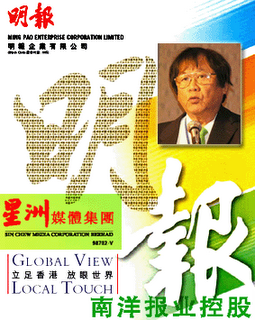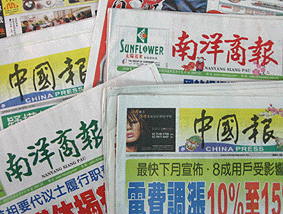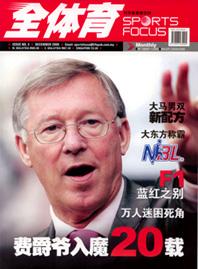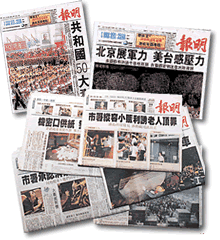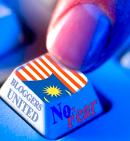The following article is taken from Asia Times Online.
By Chin-Huat Wong
KUALA LUMPUR - A giant global Chinese-language media conglomerate could emerge as early as next year, with 5,000 media-related staff putting out five daily newspapers and 30 magazine titles. Its editorial vision is to unite socially China's far-flung diaspora and promote Chinese culture and civilization around the world.
That's at least the vision of Malaysian timber-cum-media tycoon Tiong Hiew King, who on January 29 proposed merging his trans-Pacific Ming Pao group with two Chinese-language Malaysian media groups, Sin Chew Media and Nanyang Press. The three media groups had a combined market capitalization of RM1.4 billion (US$400 million) when the proposed merger was announced, and under the proposed structure Ming Pao would serve as the parent company and Sin Chew and Nanyang as its wholly owned subsidiaries.
Tiong, who is already in control of more than 85% of Malaysia's Chinese-language media market via Sin Chew and Nanyang, says the merger is a strategic reaction to three major trends that have challenged the region's traditional media: globalization, new media, and the rise of China. And while the merger would no doubt justify a consolidation of reporting resources, more broadly he believes the merged entity will result in "a media network that belongs to the Chinese of the world".
When it comes to Chinese-language media, Tiong knows what he's talking about. His Ming Pao Enterprise Corp currently publishes the fourth-best-selling newspaper in Hong Kong, Ming Bao, and its sister newspapers in New York, San Francisco, Toronto and Vancouver. He started off with the Sin Chew group, which currently owns the top and third-best-selling Chinese-language dailies in Malaysia and distributes sister newspapers in Indonesia and Cambodia. Last October, Tiong officially acquired Nanyang Press's controlling stake after a de facto takeover of his previous rival.
Some media watchers are already questioning the economics of the deal, which entails Nanyang delisting from the Kuala Lumpur stock exchange and Sin Chew becoming the first dual listing of a company in both Malaysia and Hong Kong. Sin Chew shareholders are scheduled to receive an exchange of 3.3 new Ming Pao shares - valued at HK$2.7 (34 US cents) - for every Sin Chew share (RM4), while Nanyang shareholders would get 3.47 new shares of the merged entity for each or their current shares (RM4.2).
Some media watchers contend that the arrangement will disadvantage minority shareholders, especially those in Ming Bao, particularly considering that all three media companies suffered declining financial performances last year. The worst performer, Nanyang, registered a loss of 6.4 million yuan for the financial year that ended last June.
Yet so far the market has responded positively to the idea of a global Chinese-language media conglomerate, pushing up Ming Pao's shares by more than 15% the day after the merger proposal was announced. Those investors who apparently sensed that a big move was imminent had already driven up Ming Pao's shares by 33% between January 11 and 12 this year.
So far there has been no major resistance to the proposed deal, though the fact that Ming Pao is incorporated in Bermuda would seem to violate a government ban on foreigners owning Malaysian media. If it becomes a reality, Tiong's merged entity will be the largest Chinese-language media conglomerate in the world outside mainland China or Taiwan. And, according to Sin Chew executive director Rita Sim, Tiong's media vision will not be confined to print, but will soon move into television and radio.
From pulp to paper
With a global timber business spanning four continents, including interests in Russia, Brazil, New Zealand, Gabon, Equatorial Guinea, Indonesia, Vanuatu and Papua New Guinea, and affiliated interests in banking, fisheries and infrastructure, the 73-year-old former rubber-tapper was recently ranked by Malaysian Business as Malaysia's ninth-richest man.
According to a 2004 report from environmental group Greenpeace, Tiong's 60-odd inter-linked companies control more than half of Papua New Guinea's large-scale commercial logging operations, accounting for more than 55% of the country's total log exports. He also runs an English-language daily there, The National, which some note seldom reports on Papua New Guinea's logging industry and touchy deforestation issues.
Greenpeace campaigner Dorothy Tewkie has accused Tiong's Rimbunan Hijau group of having "an appalling record of human-rights abuses, environmental crime and forest destruction in many countries across the world". The environmental group alleged that Tiong's business empire has been protected by "an extensive and well-established network of political patronage and media control" both at home and abroad. Tiong has consistently denied the charges.
Tiong first diversified into media in 1988, when he was invited to revive Malaysia's Sin Chew Jit Poh by its employees and senior leaders of the ethnic-Chinese community. The once-vocal Chinese daily newspaper had been closed down by then prime minister Mahathir Mohamad during his infamous "Operasi Lalang" crackdown, which resulted in the detention of 107 political dissidents. The revived publication played on its critical and persecuted past to build up a new liberal profile.
Profits from the paper were astutely channeled into local Chinese charities and cultural activities. One particular activity presaged Tiong's global vision of promoting Chinese culture abroad. In 1991, Sin Chew launched the Hua Zhong literature award for local Chinese writers. The prestigious award was later opened to Chinese essayists, novelists and poets worldwide in 2001. Renowned Chinese writers and intellectuals, including Wang An Yi, Chen Ying Zhen, Nan Fang Shuo, Long Ying Tai, Xi Xi and Tao Jie, have all attended either the award ceremony or other cultural events at Sin Chew's invitation.
Sin Chew soon thereafter overtook its longtime market rival Nanyang Siang Pao in circulation. The heated competition for Malaysia's Chinese-reading audience became a duopolistic standoff by 1992, when Sin Chew acquired Guang Ming Daily and Nanyang bought the tabloid China Press. But soon the two respected publications became embroiled in political factionalism, which some contend undermined their editorial independence. Under Malaysia's Printing Presses and Publication Act, the press is required each year to reapply to the government for a publication license, which may be revoked without official reasoning or judicial recourse.
When the factionalized Malaysian Chinese Association (MCA), the largest Chinese-based party in Malaysia's multi-ethnic ruling coalition known as the National Front (BN), split between its president and his deputy, Sin Chew's top management bet on the former while Nanyang sided with the latter. When the BN lost a by-election in November 2000, swung by the defection of ethnic-Chinese supporters over the state's high-handed handling of political activism and education policy, Mahathir blamed Nanyang and China Press for unjustly influencing the minority community's vote. Pressure soon mounted on Nanyang's owner, Quek Leng Chan, to sell off his media interests to MCA's investment arm, which was completed in May 2001.
Monopolistic ambitions
The takeover was widely and vigorously protested by Malaysia's Chinese community as an encroachment on press freedom, and Nanyang Siang Pao was later widely stigmatized as a government mouthpiece. Its circulation subsequently plummeted, a significant factor in the media organization's financial loss last year. Once Malaysia's largest Chinese-language daily, the publication, which has an 84-year history, now ranks near the bottom in readership surveys.
To many, the episode has spoken volumes about the editorial integrity of Tiong's publications. Not only did Tiong's Sin Chew newspaper not carry news of Nanyang's takeover and the Chinese community's visceral response, but the representatives sent by MCA's investment arm to run Nanyang temporarily after the takeover were former Sin Chew senior managers and editors. Sin Chew's perceived collaboration in the Nanyang takeover led to a mass boycott by more than 90 columnists and commentators of all four newspapers.
The four Chinese-language newspapers have allegedly since collectively filtered news and rejected public advertisements on issues likely to be perceived as sensitive to the MCA or Tiong's friends in government, from corruption scandals of primary schools to the economic plight of pig farmers. Significantly, such self-censorship was apparently not ordered by the Ministry of Information, as the news and advertisements were carried by its young rival, the Oriental Daily. From its inception, however, the Oriental Daily has encountered difficulty distributing through local vendors, who claim they would be denied supplies of Tiong's four publications if they carried the paper.
Tiong later gradually acquired Nanyang's shares from the MCA and by last October had taken a controlling 44.8% stake in the media company. That sparked a new round of protests against Tiong's perceived designs to monopolize Malaysia's Chinese-language press. About 250 students and concerned readers demonstrated on November 3 in front of Sin Chew's headquarters and two regional offices, and 120 former Sin Chew cadet reporters have come out to oppose Tiong's move toward media monopolization.
In light of that corporate history, Tiong's new global ambitions are already drawing parallels with Australian media mogul Rupert Murdoch, who famously went on a global media-buying spree and, in pursuit of high returns on his investments, has allegedly sacrificed the editorial integrity of many of the once-respected English-language media he purchased.
With an eye on China's enormous media-market potential, Tiong is apparently not bothered by the comparisons. At the press conference announcing the planned merger, Sin Chew senior executive Rita Sim vowed to maintain editorial independence for the individual newspapers while simultaneously pursuing "economies of scale, operational rationalization and market re-segmentation". But Tiong now seems more intent on winning over Beijing - rather than his critics - to his global media vision.
Rumors have recently circulated that Tiong held talks with Richard Li, the son of billionaire Hong Kong tycoon Li Ka-shing and the current chairman of PCCW Ltd, about acquiring a stake in Hong Kong's Television Broadcasts Ltd (TVB). Former Ming Pao insiders, on the other hand, say Tiong would more likely choose to deal with former People's Liberation Army colonel Liu Changle, who leads mainland China's Phoenix TV, a satellite television operator that beams its content to audiences in North America and Southeast Asia.
Tiong has made clear in interviews in Malaysia his intention to enter China's fast-expanding and lucrative media market. Any possible expansion, merger or partnership in China would likely require Beijing's approval, explaining perhaps in part Tiong's recent gung-ho pro-China message. Partly because pan-Chinese cultural nationalism is being evoked, and partly because Tiong's dominance now seems unassailable, his proposed merger announced last month has so far been better received by Malaysia's Chinese community than last October's seizure of a controlling stake in Nanyang.
A daily Sin Chew column ran a reader's letter on January 31 warning Tiong's media monopoly critics not to become "traitors" of the Chinese by opposing this "world-shattering" move. However, Tiong's bold move also likely means his critics will have even less space to air opposing views in Malaysia's monopolized Chinese-language media, and perhaps some day soon in other Chinese-language markets across the globe.
Chin-Huat Wong is a journalism lecturer in Malaysia. He is also the chairman of the Writers Alliance Media Independence (WAMI) formed in response to the Nanyang takeover in 2001.
点击阅读全文
 今年的媒体,对马华领袖的丰功伟绩的报导更加够力,新春佳节前后,报纸几乎天天有领袖们的活动报导,都是一些令国人感动涕零的壮举,如带领穷孩子穷家长坐摩天轮,如到老人院派红包,还有各式各样的专访以突出领袖的英明神武,都是一些替领袖们歌功颂德,制造领袖高大形象的报导和评论,也许歌功颂德有点过火了,连马华总会长黄家定都觉得不好意思。
今年的媒体,对马华领袖的丰功伟绩的报导更加够力,新春佳节前后,报纸几乎天天有领袖们的活动报导,都是一些令国人感动涕零的壮举,如带领穷孩子穷家长坐摩天轮,如到老人院派红包,还有各式各样的专访以突出领袖的英明神武,都是一些替领袖们歌功颂德,制造领袖高大形象的报导和评论,也许歌功颂德有点过火了,连马华总会长黄家定都觉得不好意思。 逐名利的领袖,当然希望媒体继续歌功颂德,黄家定不是那种领袖。根据《南洋商报》的报导,他在马华媒体之夜致词时指出,政府需要媒体扮演督促、纠正及唤醒的角色,以使政府维持正确的原则,做正确的事。他说,媒体不断的鞭策及提醒,使整体社会包括政府及人民,必须常常维持正确的原则,做对的事情,也让政府了解需要关注之处。
逐名利的领袖,当然希望媒体继续歌功颂德,黄家定不是那种领袖。根据《南洋商报》的报导,他在马华媒体之夜致词时指出,政府需要媒体扮演督促、纠正及唤醒的角色,以使政府维持正确的原则,做正确的事。他说,媒体不断的鞭策及提醒,使整体社会包括政府及人民,必须常常维持正确的原则,做对的事情,也让政府了解需要关注之处。 林良实和黄家定维持正确的原则,做正确的事,伙同张晓卿控制中文报业,就是为了让媒体督促和鞭策政府,在马华及张晓卿控制的中文报里任职的同志们,可不要以 为我党领袖都是好大喜功,爱听歌功颂德的庸俗之徒,他们都是堂堂正正的人,清清白白的官,他们要媒体不断的鞭策和提醒,以便他们维持正确的原则和做正确的事,同志们不要误解了他们的意思。黄家定把话讲清楚之后,同志们今后不必再歌功颂德了。
林良实和黄家定维持正确的原则,做正确的事,伙同张晓卿控制中文报业,就是为了让媒体督促和鞭策政府,在马华及张晓卿控制的中文报里任职的同志们,可不要以 为我党领袖都是好大喜功,爱听歌功颂德的庸俗之徒,他们都是堂堂正正的人,清清白白的官,他们要媒体不断的鞭策和提醒,以便他们维持正确的原则和做正确的事,同志们不要误解了他们的意思。黄家定把话讲清楚之后,同志们今后不必再歌功颂德了。 不知道,即没有说话的权力。龙女士(左图)清楚本身的局限与影响力和作为作家的责任。作为一位不曾居住于大马的海外华人作家,大马的多元种族情境和政经文教发展进程对她而言是极为陌生,贸然作出评论既无法为读者释疑,更可能误导读者。
不知道,即没有说话的权力。龙女士(左图)清楚本身的局限与影响力和作为作家的责任。作为一位不曾居住于大马的海外华人作家,大马的多元种族情境和政经文教发展进程对她而言是极为陌生,贸然作出评论既无法为读者释疑,更可能误导读者。 目前华社对自身的身份、权力和利益的焦虑应该是八十年代华社民权运动后的另一高峰。一连串种族、文化和宗教争议让华社意识到自己在国家独立五十年之际对执政 菁英而言仍是一个外来者和威胁,而许多宪法下的合法权益亦不断被吞蚀。诡异的是,相比较于八十年代华社曾轰轰烈烈地以行动来捍卫自己的权益,今天的华社弥漫着一股浓厚的无力感,认为现存的政治和社会乱象无法改变。有能力者选择移民外国发展,而没有能力者则选择赚取越多的财富来自保。
目前华社对自身的身份、权力和利益的焦虑应该是八十年代华社民权运动后的另一高峰。一连串种族、文化和宗教争议让华社意识到自己在国家独立五十年之际对执政 菁英而言仍是一个外来者和威胁,而许多宪法下的合法权益亦不断被吞蚀。诡异的是,相比较于八十年代华社曾轰轰烈烈地以行动来捍卫自己的权益,今天的华社弥漫着一股浓厚的无力感,认为现存的政治和社会乱象无法改变。有能力者选择移民外国发展,而没有能力者则选择赚取越多的财富来自保。 华 社从来不曾缺乏知识分子。时至今日,大马华社依然有一群知识分子如潘永强、陈亚才、李万千等,关心民间疾苦,忧虑社会未来,并思考和批判国家的所作所为,企图改变国家和社会。他们曾发表一些在华社引起巨大争论的言论,却使华社真正认识到自身里外的问题。大家肯定忘不了潘永强曾在几年前批判马华“逃离政 治”。然而,马来西亚华社逐渐被政治收编的舆论平台却使本地知识分子被隐没或边缘化,使他们未能引领社会思潮谋求改变。
华 社从来不曾缺乏知识分子。时至今日,大马华社依然有一群知识分子如潘永强、陈亚才、李万千等,关心民间疾苦,忧虑社会未来,并思考和批判国家的所作所为,企图改变国家和社会。他们曾发表一些在华社引起巨大争论的言论,却使华社真正认识到自身里外的问题。大家肯定忘不了潘永强曾在几年前批判马华“逃离政 治”。然而,马来西亚华社逐渐被政治收编的舆论平台却使本地知识分子被隐没或边缘化,使他们未能引领社会思潮谋求改变。 巫青副团长凯里挑起族群边缘化议题,只见政治人物和媒体狭隘地妖魔化对方并高呼捍卫己方权益,却不见对族群财富分配零和论和国阵分而治之局面的反思。张晓卿收购南洋报业时,旗下媒体拒绝刊登反对声音,也拒绝在其他媒体回应该议题,致使支持和反对收购演变成各说各话。各别读者只能接收各别报章的讯息,却从不知悉其他相反的意见,因而未能真正思考媒体垄断议题。问题一日复一日的发生,华社却始终逃不出思想的框框,而无法采取行动做出改变,无力感自然日渐浓厚。
巫青副团长凯里挑起族群边缘化议题,只见政治人物和媒体狭隘地妖魔化对方并高呼捍卫己方权益,却不见对族群财富分配零和论和国阵分而治之局面的反思。张晓卿收购南洋报业时,旗下媒体拒绝刊登反对声音,也拒绝在其他媒体回应该议题,致使支持和反对收购演变成各说各话。各别读者只能接收各别报章的讯息,却从不知悉其他相反的意见,因而未能真正思考媒体垄断议题。问题一日复一日的发生,华社却始终逃不出思想的框框,而无法采取行动做出改变,无力感自然日渐浓厚。


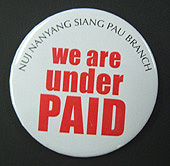




 On Jan 30, the Malaysia-based Sin Chew Media Corporation
On Jan 30, the Malaysia-based Sin Chew Media Corporation 


 庄易凡,环境工程师,去年才刚从工大毕业。11月3日抱着捍卫新闻自由,反对官商合谋垄断的信念,出席了在《星洲日报》八打灵再也总社前的反报业垄断和平静坐活动。当晚,他在现场发现前来的参与者,不乏和他有相同背景的人──中学时期曾参与《星洲日报》的学生记者。于是,集会活动后他尝试联系这群具有共同反垄断信念的朋友。大家经过磋商后,认为有必要站出来表达反对官商合谋,垄断中文报业的心声。最后,这群年轻人决定串连各地的《星洲》前学记,起反媒体垄断连署活动。
庄易凡,环境工程师,去年才刚从工大毕业。11月3日抱着捍卫新闻自由,反对官商合谋垄断的信念,出席了在《星洲日报》八打灵再也总社前的反报业垄断和平静坐活动。当晚,他在现场发现前来的参与者,不乏和他有相同背景的人──中学时期曾参与《星洲日报》的学生记者。于是,集会活动后他尝试联系这群具有共同反垄断信念的朋友。大家经过磋商后,认为有必要站出来表达反对官商合谋,垄断中文报业的心声。最后,这群年轻人决定串连各地的《星洲》前学记,起反媒体垄断连署活动。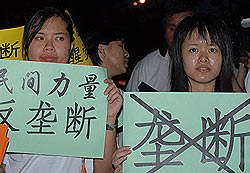 同样地,另一位连署召集人廖秋怡在受访时,表示中学时的学记生涯,让她学会关心社会,培养明察思辨的能力和独立思想的精神。
同样地,另一位连署召集人廖秋怡在受访时,表示中学时的学记生涯,让她学会关心社会,培养明察思辨的能力和独立思想的精神。 「那篇437个字的报导,就是反垄断最好的理由。」前寰宇电视AEC政论节目「就事论事」记者,目前在台湾世新大学唸书的张溦紟,向记者如此表示。
「那篇437个字的报导,就是反垄断最好的理由。」前寰宇电视AEC政论节目「就事论事」记者,目前在台湾世新大学唸书的张溦紟,向记者如此表示。 《星洲日报》学生记者于1985年创办于霹雳州,随后更在半岛各州推行,迄今已历21年,目前马华新闻、评论和文化界不少中坚分子,皆曾在中学时期参与学记,如参与这次连署的著名时评人黄进发、曾维龙、周添健、文化人魏月萍、媒体人庄迪澎、张溦紟和知名女导演陈翠梅等人。
《星洲日报》学生记者于1985年创办于霹雳州,随后更在半岛各州推行,迄今已历21年,目前马华新闻、评论和文化界不少中坚分子,皆曾在中学时期参与学记,如参与这次连署的著名时评人黄进发、曾维龙、周添健、文化人魏月萍、媒体人庄迪澎、张溦紟和知名女导演陈翠梅等人。
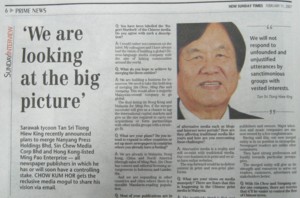
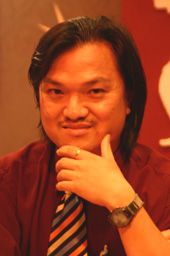
 著名部落客黄泉安揭露有关方面正进行一系列的周详策划,以便把部落客加以妖魔化。
著名部落客黄泉安揭露有关方面正进行一系列的周详策划,以便把部落客加以妖魔化。 黄泉安(右图右二)昨晚是在民主行动党举办的“网络空间消声:最后的边疆”讲座上表示,政府部长发表这种谈话是非常具警惕性的,因为这并非单独事件,而是经过周详策划,对部落客进行妖魔化。
黄泉安(右图右二)昨晚是在民主行动党举办的“网络空间消声:最后的边疆”讲座上表示,政府部长发表这种谈话是非常具警惕性的,因为这并非单独事件,而是经过周详策划,对部落客进行妖魔化。 这位瞩目政论部落客因为被指发表存有诽谤性《新海峡时报》及高层的文章,而遭到新海峡时报集团及该集团3名现任及前任编务高层
这位瞩目政论部落客因为被指发表存有诽谤性《新海峡时报》及高层的文章,而遭到新海峡时报集团及该集团3名现任及前任编务高层 黄泉安指出,这个大马首宗主流媒体起诉部落客诽谤的案件,已经造成一种寒蝉效应,而这可从其部落格所收到的读者回应多寡看出。在诽谤案之前,其部落格每天拥有百多封读者回应,但是在诽谤案消息曝光后的隔天,只有区区不到5封的读者回应。
黄泉安指出,这个大马首宗主流媒体起诉部落客诽谤的案件,已经造成一种寒蝉效应,而这可从其部落格所收到的读者回应多寡看出。在诽谤案之前,其部落格每天拥有百多封读者回应,但是在诽谤案消息曝光后的隔天,只有区区不到5封的读者回应。 另一方面,杨映波表示,我国现有的诽谤法令必须进行革新,以便对个人声誉和言论自由拥有平衡的保障。
另一方面,杨映波表示,我国现有的诽谤法令必须进行革新,以便对个人声誉和言论自由拥有平衡的保障。 索妮雅则批评政府当初《1998年传播及多媒体法令》所承诺不会过滤网际网络,是基于外国投资者的压力,而并非因为政府拥有言论自由的思想。
索妮雅则批评政府当初《1998年传播及多媒体法令》所承诺不会过滤网际网络,是基于外国投资者的压力,而并非因为政府拥有言论自由的思想。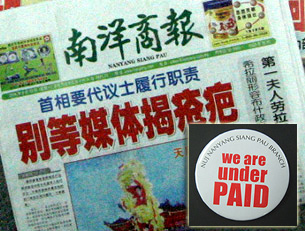
 独立新闻中心(The Centre for Independent Journalism,简称CIJ) 对砂拉越木材大亨张晓卿所拥有的三家媒体集团――香港明报集团、马来西亚星洲媒体集团及南洋报业控股的合并建议感到忧虑,并认为此合并计划将损害媒体竞争及置国内外中文报读者于更大的政治操控之下。
独立新闻中心(The Centre for Independent Journalism,简称CIJ) 对砂拉越木材大亨张晓卿所拥有的三家媒体集团――香港明报集团、马来西亚星洲媒体集团及南洋报业控股的合并建议感到忧虑,并认为此合并计划将损害媒体竞争及置国内外中文报读者于更大的政治操控之下。 独立新闻中心执行董事索妮雅(左图)今日发表文告指出,整合张晓卿的媒体帝国将促进与西方媒体集团的竞争的说法只是一个神话。英文读者不会因为中文报拥有更强大的国际势力和网络而转而支持《明报》(香港、美国及加拿大)或《星洲日报》(马来西亚、印尼和柬埔寨),一如不能比较半岛电视台(Al- Jazeera)和美国有线新闻网(CNN)。
独立新闻中心执行董事索妮雅(左图)今日发表文告指出,整合张晓卿的媒体帝国将促进与西方媒体集团的竞争的说法只是一个神话。英文读者不会因为中文报拥有更强大的国际势力和网络而转而支持《明报》(香港、美国及加拿大)或《星洲日报》(马来西亚、印尼和柬埔寨),一如不能比较半岛电视台(Al- Jazeera)和美国有线新闻网(CNN)。 相反的,媒体整合只会压制和阻止马来西亚、香港、美国、加拿大、印尼及柬埔寨中文报业的竞争和多元性。就算合并后的资源共享可期,张晓卿庞大的媒体帝国将有能力逐渐削弱或淘汰在这些国家内的竞争者,也阻止新的竞争者进场。最终,中文读者群、记者和广告商将无法在新闻来源、就业和市场上有其他的选择。
相反的,媒体整合只会压制和阻止马来西亚、香港、美国、加拿大、印尼及柬埔寨中文报业的竞争和多元性。就算合并后的资源共享可期,张晓卿庞大的媒体帝国将有能力逐渐削弱或淘汰在这些国家内的竞争者,也阻止新的竞争者进场。最终,中文读者群、记者和广告商将无法在新闻来源、就业和市场上有其他的选择。 独立新闻中心强调,媒体的和并也反映了张晓卿和星洲媒体的低落信用度。星洲媒体集团董事经理兼集团编务总监刘鉴铨曾于2006年11月3日在《星洲日报》发 表专文《反垄断是我们的信念》(英文版We don’t believe in monopolies于同年11月6日在《星报》发表),声称“尽管大股东同样是张晓卿,但是,《星洲日报》、《光明日报》、《南洋商报》和《中国报》,都是不同的企业实体,过去彼此之间独立运作,相互竞争;今后还是保持这种模式,在价格、品质、技术、产品创新和行销上竞争”。刘鉴铨宣示此保证仅仅三个月后,公众又听闻国内两大报业集团将与香港明报集团合并。
独立新闻中心强调,媒体的和并也反映了张晓卿和星洲媒体的低落信用度。星洲媒体集团董事经理兼集团编务总监刘鉴铨曾于2006年11月3日在《星洲日报》发 表专文《反垄断是我们的信念》(英文版We don’t believe in monopolies于同年11月6日在《星报》发表),声称“尽管大股东同样是张晓卿,但是,《星洲日报》、《光明日报》、《南洋商报》和《中国报》,都是不同的企业实体,过去彼此之间独立运作,相互竞争;今后还是保持这种模式,在价格、品质、技术、产品创新和行销上竞争”。刘鉴铨宣示此保证仅仅三个月后,公众又听闻国内两大报业集团将与香港明报集团合并。 新闻工作者迎向来袭的寒流,以古鉴今,以西喻东,以外警内,表达埋藏在他们心中的新闻自由理念。这种文章,如果出现在垄断主拥有的报纸上,都会被网络上兼收 并容的正宗“沟通平台”所链接。这是好现象。在垄断主所控制的媒体里工作的朋友们,你们在里面努力突围,在外的朋友都感谢你们。
新闻工作者迎向来袭的寒流,以古鉴今,以西喻东,以外警内,表达埋藏在他们心中的新闻自由理念。这种文章,如果出现在垄断主拥有的报纸上,都会被网络上兼收 并容的正宗“沟通平台”所链接。这是好现象。在垄断主所控制的媒体里工作的朋友们,你们在里面努力突围,在外的朋友都感谢你们。 陈宝卿指责中国政府继禁书风波之后,无理禁止20名作家到香港出席2007年国际笔会亚太地区会议。她说中国政府禁书,禁止作家出席国际笔会会议,是害怕面对真相。她问道:“为什么一个大国不允许人讲真话,不允许把历史真实的面貌写出来?”问得太好了。
陈宝卿指责中国政府继禁书风波之后,无理禁止20名作家到香港出席2007年国际笔会亚太地区会议。她说中国政府禁书,禁止作家出席国际笔会会议,是害怕面对真相。她问道:“为什么一个大国不允许人讲真话,不允许把历史真实的面貌写出来?”问得太好了。 我不认识陈宝卿,但我希望她会是捅破媒体垄断主的天罗地网而展翅高飞的其中一只精灵。我不是要吹捧陈宝卿,我要说的是,她这篇好文章,借中国的新闻自由状况以喻大马,能够出现在落力掩盖反媒体垄断新闻的第一大报,实在难能可贵。对那些和政客勾结制造假新闻和掩盖新闻的新闻界前辈们,还有被誉为华文报太上总编 辑的丑陋政客,我特别推荐陈宝卿这篇文章。作家和书,还禁得了吗?新闻还封锁得了吗?真相还掩盖得了吗?假话还骗得了人吗?陈宝卿和争取新闻自由的朋友们,加油!
我不认识陈宝卿,但我希望她会是捅破媒体垄断主的天罗地网而展翅高飞的其中一只精灵。我不是要吹捧陈宝卿,我要说的是,她这篇好文章,借中国的新闻自由状况以喻大马,能够出现在落力掩盖反媒体垄断新闻的第一大报,实在难能可贵。对那些和政客勾结制造假新闻和掩盖新闻的新闻界前辈们,还有被誉为华文报太上总编 辑的丑陋政客,我特别推荐陈宝卿这篇文章。作家和书,还禁得了吗?新闻还封锁得了吗?真相还掩盖得了吗?假话还骗得了人吗?陈宝卿和争取新闻自由的朋友们,加油!